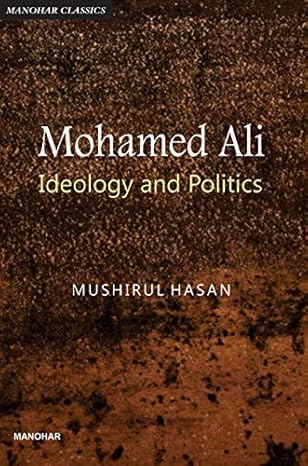Mohamed Ali: Ideology and Politics
no information available
From the time of the establishment of the Muslim League in 1906 Mohamed Ali (1878-1931) was in the centre of every melee as reformer and social radical as crusader for the Turkish cause and as champion of Muslim political interests. His was a many-faceted mind any one of whose facets would have made the reputation of a lesser man. His asset was that he possessed to the full the resources of traditional oratory – its repertoire of tricks. Few orators or political journalists among his contemporaries had his combination of qualities: his range of articulate emotions his capacity for analytical argument his pathos fantasy and wit and his power to marshal all these towards ends clearly discerned and passionately desired. This volume is the first scholarly attempt to assess and analyse the role and influence of Mohamed Ali in Muslim society to enlarge our understanding of his contribution to Indian politics and to explore the circumstances which facilitated his emergence from obscurity to a dramatic assertion of power during the Khilafat and Non-Cooperation campaigns. With the aid of a wide range of original sources this study analyses Mohamed Ali's reactions and responses to the dominant trends in Indian politics highlights his relationship with the Indian National Congress and its leaders like Gandhi Motilal Nehru Madan Mohan Malaviya and M.A. Ansari and examines his debate with contemporary politicians on the communal question the Congress movement and on the role of the British in India. This study begins with a biographical sketch continues with chapters on Mohamed Ali’s association with and involvement in various religious and political movements and concludes with an assessment that aims to delineate the many strands in his ideological makeup. The Appendices contain some hitherto unpublished correspondence of Mohamed Ali. They are drawn from sources in India Pakistan and England. About the Author Mushirul Hasan (1949-2018) was a historian of modern India. He wrote extensively on the partition of India communalism and on the history of Islam in South Asia. He served as the Vice-Chancellor of Jamia Millia Islamia New Delhi and the Director-General of the National Archives of India.
... Read more Read less










